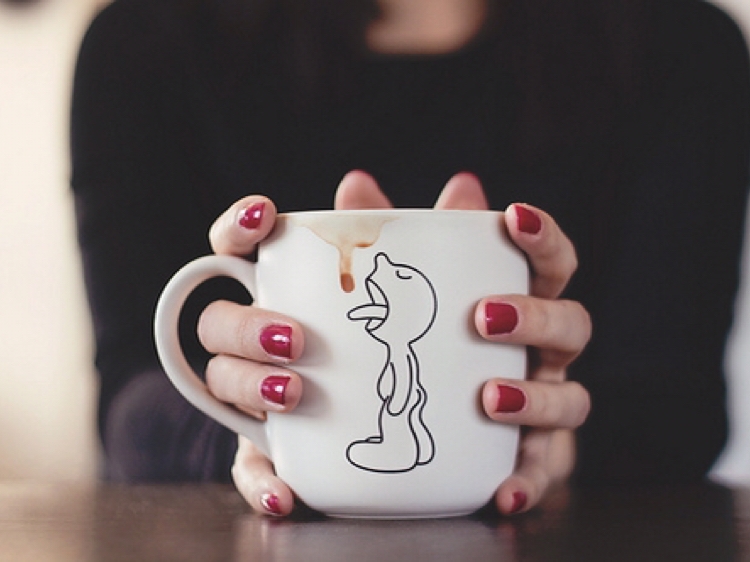"No matter how busy I am, I will have a cup of coffee with you." the best distance between coffee and coffee.

For professional baristas, please follow the coffee workshop (Wechat official account cafe_style)
"No matter how busy I am, I'll have a cup of coffee with you." The classic advertising lines are impressive, the charm of coffee sweeping the world and many doubts and fears about coffee coexist, is it good to drink coffee? Is there any way to reap the benefits of coffee without suffering from it?
From cheap coffee in convenience stores to canned coffee to boutique cafes, Taiwan's coffee market has boomed in recent years, with an estimated 20 billion in size.
"having a cup of coffee" has not only become a footnote for leisure in life, but in recent years, many studies have even pointed out that this kind of drink with strong flavor and slightly bitter taste may also be beneficial to the body.
A few days ago, foreign studies pointed out that coffee has a protective effect on liver fibrosis: patients with liver disease who consume an average of 21.2 mg of caffeine a day are less severe than those who consume about 154 mg of caffeine.
In the past, studies have shown that coffee can fight depression, control weight, and even fight cancer and prevent cardiovascular disease, despite fears that coffee will cause osteoporosis and become addicted to coffee.
Is it good to have coffee? Is there any way to reap the benefits of coffee without suffering from it?
Coffee is both good and bad.
Huang Yiwen, an attending physician at the liver Center of Cathay Pacific Hospital, points out that many of the "vindication" for the health benefits of coffee drinking are epidemiological studies, which draw conclusions from observations rather than experimental results. although the evidence is clear, it still has its limitations.
In addition, the benefits of drinking coffee have not yet been finalized.
For example, in the past, it was thought that too much coffee would increase the risk of cardiovascular disease, but it was also pointed out that coffee contains antioxidants, which can help prevent cancer and diabetes, as well as protect the cardiovascular system. A study in the Netherlands last year even suggested that drinking two to four cups of coffee a day can reduce the risk of heart disease. Is coffee good or bad for cardiovascular disease? The answer is still not unanimous.
Many of the "good" brought by coffee are in fact conditional and should not be over-interpreted.
Zhang Shilan, a dietitian at the Neihu Cathay Pacific Clinic, points out that if a study shows that 100 milligrams of caffeine can increase the body's metabolism by 3% to 4%, it can help control weight. But it must be noted that this is only a temporary stimulus; if you drink for a long time and the body adapts to the stimulation, it may not improve metabolism. Cao Yazi, a dietitian in the Department of Nutrition Therapy of Chang Geng in Linkou, even reminded that if sugar or cream is added to the coffee, it will bring calories.
Xie Wanqing, a dietitian at Xinguang Hospital, also gives an example: caffeine in coffee stimulates gastrointestinal peristalsis, so it has the effect of improving constipation; on the contrary, caffeine stimulates gastric acid secretion, or gastrointestinal peristalsis is faster in people with colorectal agitation or gastric ulcers, but more uncomfortable.
Stop watching and listening to drink coffee
Many of the "good" and "bad" aspects of coffee are in fact two sides of the same body; the results of the study are not consistent, and coffee should not be regarded as a preventive health product or a therapeutic drug. Experts suggest:
Take in the right amount. Caffeine intake is recommended not to exceed 300 milligrams a day. Many coffee chains have begun to color caffeine: red means caffeine is 200 to 300, or more than 300 milligrams, yellow is 100 to 200 milligrams, and green is less than 100 milligrams. Starbucks also provides the caffeine content of each type of coffee.
The time to avoid coffee
But the average, standard, and actual effect can vary from person to person: some people drink three drinks a day, while others can't sleep after half a cup. Cao Yazi advises not to drink when uncomfortable and uncomfortable conditions such as palpitations occur. In addition, caffeine is also found in other foods such as cola and chocolate.
In particular, many people think that drinking lattes consumes less caffeine. However, Cao Yazi points out that a survey has found that the caffeine content of different supermarket lattes ranges from 90 mg to more than 360 mg, with emphasis on the ratio of coffee to milk.
Avoid coffee taboos. There are several types of people who are not suitable for drinking coffee, including developing children, people who are pregnant or breastfeeding, the elderly, people with an empty stomach, sensitive intestines, excessive stomach acid, sedatives, smokers, after drinking, kidney dialysis patients, hypertension patients, and so on.
Zhang Silan also advises people with sleep disorders not to drink coffee after noon.
Coffee is not recommended when you have a cold. Xie Wanqing points out that this is mainly because a cold needs more rest, but coffee excites the central nervous system.
Women after menopause had better not drink too much coffee. In fact, coffee is not the cause of osteoporosis. Hsieh Wan-ching points out that if young girls get enough calcium, they don't have to worry about drinking the right amount of coffee. But after menopause, women lose a lot of calcium because of a decrease in female hormones. Drinking more coffee is not recommended at this time.
Avoid sugar and cream. The right amount of coffee is harmless, but the addition of sugar and cream will hurt the body.
In addition to increasing calories, sugar and cream contain more trans fats, which accumulate on the walls of blood vessels for a long time. Nutritionists suggest that low-fat milk can replace cream to avoid the risk of trans fat and increase calcium absorption.
Important Notice :
前街咖啡 FrontStreet Coffee has moved to new addredd:
FrontStreet Coffee Address: 315,Donghua East Road,GuangZhou
Tel:020 38364473
- Prev

Nespresso launches Discovery Series 2 rare limited edition coffee
Professional barista exchanges, please pay attention to coffee workshop (Weixin Official Accounts cafe_style) After the first launch of Explorations 1 series rare limited coffee in May, we offer coffee connoisseurs and enthusiasts Exploration 2 rare limited coffee-Explorations 2 again. Nespresso coffee experts explore little-known coffee origins around the world, culling single origins
- Next

Youth invincible is to MAX Ximenting flash dance to taste the coffee.
Exchange of professional baristas Please follow the Coffee Workshop (Wechat official account cafe_style) ▲ under the auspices of Maxwell Coffee, Ximenting, which has always been full of youth, held a pop-up event featuring showgirl dance and cosplay parade on the afternoon of the weekend. On the afternoon of the weekend, Ximenting, which has always been full of youthful vitality, held a showgirl dance and cosplay tour.
Related
- What grade does Jamaica Blue Mountain No. 1 coffee belong to and how to drink it better? What is the highest grade of Blue Mountain coffee for coffee aristocrats?
- What are the flavor characteristics of the world-famous coffee Blue Mountain No. 1 Golden Mantelin? What are the characteristics of deep-roasted bitter coffee?
- Can I make coffee a second time in an Italian hand-brewed mocha pot? Why can't coffee be brewed several times like tea leaves?
- Hand-brewed coffee flows with a knife and a tornado. How to brew it? What is the proportion of grinding water and water temperature divided into?
- What is the difference between Indonesian Sumatra Mantinin coffee and gold Mantinin? How to distinguish between real and fake golden Mantelin coffee?
- What does bypass mean in coffee? Why can hand-brewed coffee and water make it better?
- Unexpected! Ruixing Telunsu lattes use a smoothie machine to foam milk?!
- % Arabia's first store in Henan opens into the village?! Netizen: Thought it was P's
- Does an authentic standard mocha coffee recipe use chocolate sauce or powder? Mocha Latte/Dirty Coffee/Salty Mocha Coffee Recipe Share!
- What is the difference between Vietnam egg coffee and Norway egg coffee? Hand-brewed single product coffee filter paper filter cloth filter flat solution!

